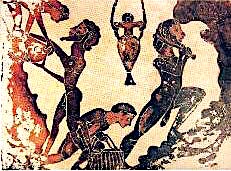Workers Need Communist Revolution, Not Democratic Elections—Part II
History is propaganda. At least, the history fed us in our text-books, films and mass media. Wherever you look democracy is presented in glowing terms. It’s linked with respect for human kind, a tolerant society, a champion of equality.. In the US, India, China, Austria and elsewhere millions are being called on to oppose rising fascism in the name of democracy.
We cannot let this happen. Democracy is, and has always been, a lie. It promises equality but delivers inequality. It serves the needs of capitalist production not the needs of the masses.
Ancient Democracy: Chattel Slavery in Athens

Greek slaves in the silver mines
That was certainly true in the ancient Greek city-state of Athens. Historians label it “the cradle of Western Civilization and the birthplace of democracy.” The most significant advances came from a ruler named Solon who represented the merchants against the landed aristocrats. Because of increasing commodity production (production for private profits not social need), Athens in the 6th century was in crisis. Impoverished free peasants were homeless in the fields they once held. They were on the verge of insurrection, threatening to ally with the slaves in the silver mines at Laurion. These mines were the basic source of the merchants’ and aristocracy’s wealth.
Solon revived the popular assembly from tribal (ie primitive communist) times but introduced a Council of 400 where real political power rested. He outlawed slavery for citizens (not for immigrants or foreigners), and forbade the export of corn, lowering the price of food. From then on production and slavery grew. Slaves in Greece not only mined the silver, they quarried the marble, helped build the Acropolis and were used extensively in the manufacture of knives, pots, weapons, lamps, statues and so on. You could say the male Greek peasant got the democratic vote (but no power) while the foreign slave got the democratic whip and an early death. Democracy, slavery and commodity production grew hand in hand – fitting comment about the “cradle of Western Civilization!”
Modern Democracy: Chattel Slavery and Racism
A similar story is repeated hundreds of years later with the development of industrial capital. Modern democracy first took hold in England. Merchants, bankers and industrialists finally got the “freedom” they had been fighting for when, what the historians call the “Glorious Revolution,” triumphed in 1688. It shifted the balance of power from the King to Parliament. Commodity production – the ability to profit from exploiting labor – was no longer the privilege of the King’s favorites. A company like the Royal African Company (the King’s Company), which made a 400% profit on the voyage of each slave ship, saw its monopoly broken.
The immediate fruits of the world’s first parliamentary democracy was an explosion in the slave trade. In 1699, the port of Liverpool, England, employed only one ship in the slave trade. By 1792, there were 132! For years Mayors and Councilors in the city wallowed in the filthy trade. Every brick, they used to say, in its magnificent municipal buildings was cemented with the blood of slaves. Modern capitalism was built on the super-profits of the slave trade, slavery and democracy. Why call it the “Glorious Revolution” when the first thing it did was democratize the profits of slavery?
Democracy let all the English merchants and bankers chase their share of 400% profits per voyage, condemned the English crew to deadly wage labor (1 in 5 died each voyage) and the captured African to the hell of life under a whip and chain. Once again, democracy and slavery grew hand in hand. With the re-birth of democracy, the oppression and exploitation of the masses grew.
But it was not just budding capitalists in England who profited. Their cousins in New England, Rhode Island and Massachusetts did as well. This region became the greatest slave trading community in America. They built and outfitted the ships, recruited the crews, bankrolled the voyages and enjoyed the dirty profits of the most lucrative trade of the seventeenth and
eighteenth centuries. It not only made the Colonies financially viable but strong enough to be politically independent of England.
The next article in this series will look at the US Constitution and the genocide of Native Americans.


